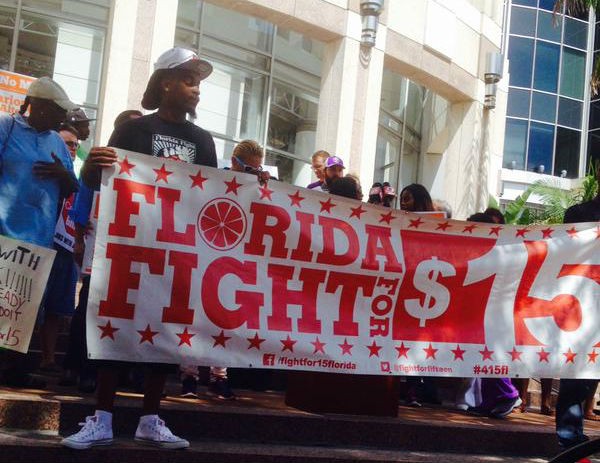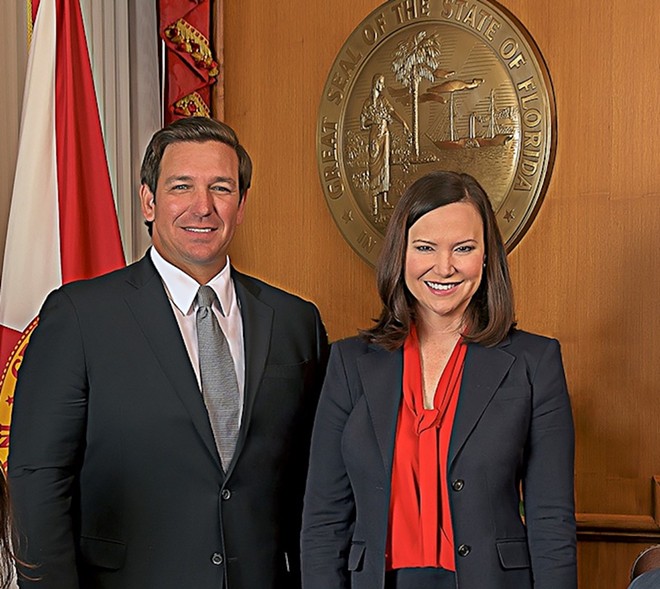Photo by Monivette Cordeiro
Florida has the nation’s third largest workforce, but no state mechanism to enforce labor laws.
For more than 20 years, the state of Florida has lacked a state labor department, which was once tasked with enforcing Florida’s state minimum wage and other wage and hour laws.
That’s right: While Florida has the nation’s third-largest workforce, it’s also one of just a few states that lacks even a single dedicated investigator on the state payroll tasked with looking into wage violations, which the labor department used to handle. And very few people in elected office — Democrat or Republican — ever really talk about it.
Former Florida governor and failed presidential candidate Jeb Bush (“Please clap”) prioritized the abolition of the state’s Department of Labor and Economic Security early on in his first term, in the early 2000s, and the state legislature moved forward with dismantling it in 2002.
As it stands, no such agency exists in the state today. But “it’s not for lack of trying,” Florida Sen. Victor Torres, an Orlando Democrat and self-described “labor guy,” told Orlando Weekly.
Legislation filed by Torres — a former union cop and bus driver — in the state Senate (SB 1598) and Rep. Angie Nixon, D-Jacksonville, in the Florida House (HB 137) sought to reestablish a state labor department.
I did. It just makes sense that we in the “Free State” of Florida would look after workers and assist in combating wage theft. According to @FloridaPolicy, Florida workers lost an average of $1.32 per hour between 2005-2019. This is only likely to get worse with our min. wage ⬆️ https://t.co/BIJouHLsoX
— State Rep. Angie Nixon (@AngieNixon) January 10, 2023
But, like in previous years, both bills died without being heard by a single committee.
That means Florida still doesn’t have any meaningful mechanism for investigating incidents of wage theft, which encompasses everything from failing to pay workers at least minimum wage to stealing a worker’s tips, failing to pay overtime, or asking employees to work “off the clock” before or after their shift ends.
That is, it’s really any form of underpayment or nonpayment of wages that a worker is legally entitled to.
Between 2017 and 2020, more than $3 billion in stolen wages were recovered by the U.S. Department of Labor, state departments of labor (must be nice to have one!), attorneys general, and through litigation, according to the Economic Policy Institute.
But Florida’s labor laws are weak, and victims of wage theft in Florida have few options to recover wages they’re owed, despite the fact that it’s a rampant problem, particularly in low-wage industries, and among women, immigrants and people of color.
And it could grow worse as Florida’s minimum wage increases.
A 2021 report from the Florida Policy Institute, a progressive think tank, shared that minimum wage violations in Florida doubled after the state raised its minimum wage in 2005, affecting 17% of Floridian’s low-wage workforce, or roughly 250,000 Florida workers each year on average.
Florida’s minimum wage, which currently sits at $11 for non-tipped employees, is set to rise to $15 by October 2026. It will increase to $12 in October of this year, thanks to a ballot initiative passed by over 60% of Florida voters in 2020.
That measure was more popular among Floridians that year than President Joe Biden or even former president Donald Trump, who won the Sunshine State’s popular vote.
But, again, without a strong enforcement mechanism for the minimum wage, there’s little help available to those who are paid less than minimum wage, or who suffer other forms of wage theft on behalf of greedy or uninformed bosses.
What are your options? You can file a complaint with the feds through the U.S. Department of Labor’s Wage and Hour Division. But that agency is not only understaffed; its powers are also limited. If your allegation concerns a minimum wage violation, the feds can only enforce the federal minimum wage. That means they can only recover up to $7.25 per hour that a worker who makes minimum wage is owed — even though Florida’s base pay is nearly $4 per hour higher.
Other than that, you can secure a lawyer or file a complaint with the state Attorney General’s Office.
Unfortunately, neither Attorney General Ashley Moody nor her predecessor, Pam Bondi, have prioritized the enforcement of wage and hour violations.
From 2011 to 2016, the state of Florida failed to take a single action against an employer to enforce wage and hour laws, according to records obtained by In These Times.
Moreover, a records request from the Florida Policy Institute found that the Attorney General’s Office apparently received just 29 complaints from 2016 to 2019 and took no formal enforcement action in that time, therefore recovering no money for Floridians who filed complaints during that period.
In comparison, researchers at the institute have noted, the state of New York fielded 6,000 complaints in 2017 alone.
Moody’s Democratic challenger last year, Aramis Ayala, sort of campaigned on addressing rampant wage theft in her 2022 bid for attorney general. But Ayala lost to Moody, earning just under 40% of the statewide vote.
Orlando Weekly called the AG’s office on Friday to ask about their enforcement of wage complaints. We did not receive a response as of publication.
The power of grassroots community activism
To help fill the gap, some Florida municipalities have stepped in to, at the very least, help workers within their own communities by establishing local mechanisms for recovering stolen wages.
In 2010, Miami-Dade County established the nation’s first broad municipal wage theft law, according to the Economic Policy Institute, providing enforcement at no cost to taxpayers.
In just its first year, the county investigated over 600 claims of wage theft and recovered over $1.7 million in stolen wages, according to the New York Times.
The same program — which accepts claims of more than $60 in unpaid wages — recovered over $3.6 million in owed wages and penalties from 2013 to 2018.
Bruce Nissen, a retired professor of labor studies at Florida International University and the author of a 2014 report on wage theft, told Orlando Weekly that victory was born out of a grassroots effort by a coalition of community groups and organizers.
He should know; he was one of them. A former labor organizer, Nissen also helped push for similar local laws in Broward County, Hillsborough County, Pinellas County, and the city of St. Petersburg.
Alachua County and Osceola County also have similar laws on the books to help combat wage theft. The city of Orlando and Orange County do not.
“The key,” said Nissen, “is grassroots activism.”
He’s not sure why a similar push hasn’t yet taken root in Orlando.
But, he said, when he was part of the push over a decade ago for the wage theft law in Miami, there was not a strong, boots-on-the-ground base of organizers pushing for the same in Central Florida.
“The working class,” said Nissen, “are the only thing that can really make substantive, transformative change in our country.”
Backed by a powerful lobby of corporate interests, Florida Republicans have explicitly tried to overturn local wage theft ordinances — but have yet to see any real success.
In 2019, a bill to accomplish as much at the statehouse died in committee.
The cost of recovering earned wages
When Florida legislators dissolved the state’s labor department in the early aughts, it was cited as a cost-saving measure.
The state tasked the Florida Attorney General’s office with enforcing minimum wage laws, establishing it as “both the first and the last line of defense for exploited workers,” as The Nation put it.
Other responsibilities of the eliminated agency were delegated to Workforce Florida, a not-for-profit organization, and the Agency for Workforce Innovation (AWI).
In recent years, labor supporters Torres and Nixon have consistently filed bills in the legislature to re-create the department.
If their legislation had advanced, a fiscal impact statement would have been required, and that would have provided a picture of the costs of adding that enforcement arm back to state government.
Not having that enforcement, however, also comes with a cost.
“When employers withhold pay from their workers, they also hurt local economies and incur costs to taxpayers,” EPI researchers wrote in a 2021 report.
Just one type of wage theft — misclassification — costs the state of California over $7 billion each year, according to California’s Department of Labor Enforcement.
A meaningful enforcement mechanism — and penalties for violating wage and hour laws — could theoretically help to curtail the scope of wage theft.
“The working class are the only thing that can really make substantive, transformative change in our country.”
tweet this
A CBS News investigation this year found that even with state systems in place, however, employers often face little accountability for wage theft, which siphons billions from Americans’ paychecks each year.
Both Nixon and Torres told Orlando Weekly that a change in state leadership would be needed in order to move forward with establishing a stronger wage and hour enforcement mechanism.
“It’s gotta be changed from the top,” said Torres, who’s term-limited from seeking reelection in 2024.
Gov. DeSantis, Nixon said, “has created an environment in the state where we’re pushing working class families out.”
Nixon pointed to the union-busting (or “paycheck protection,” as DeSantis called it) bill that the governor signed into law last week as another example of the GOP’s anti-worker priorities.
The GOP-controlled legislature also passed a bill targeting undocumented immigrants, which Florida’s Republican agriculture commissioner warns could be “a challenge” for farmers, along with the construction and tourism industries.
“Time after time after time again, we [Democrats] file legislation that is reflective of what the people want, what the people need, what they’ve been asking us for,” said Nixon, “And time and time again, like our bills aren’t heard.”
Republicans hold a supermajority in the state legislature, and thus have significant influence over what bills are heard by legislators or left to languish.
Nissen, a retiree in his 70s who now lives in Pinellas County, has a cynical outlook on the state legislature (most Democrats included), but has a hopeful take on the kind of power that can be built from the ground-up, within local communities, to force change.
Protection against wage theft, he suggests, doesn’t come to people on a silver platter, no matter who’s in office.
“The key would have to be: Can we build an activist organizing base, with a working-class base strong enough to agitate to push for these things?” said Nissen. “Because if we do, we can win it.”
Subscribe to Orlando Weekly newsletters.
Follow us: Google News | NewsBreak | Reddit | Instagram | Facebook | Twitter


